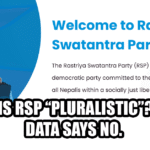The caste system has so corrupted the minds of so many Nepalis and the quality and level of education so poor that there are Nepalis who struggle to recognize the fact that life experiences they have NOT had — or those they can’t imagine having to endure — others would or could have.
Nepal does not have a dearth of those who struggle to recognize the plight of fellow Nepalis from so-called “lower castes,” especially Dalits, the so-called “lowest caste.” Worse still, if they are NOT outright denying them, they explain it away by saying “They deserved it.”
In other words, there are Nepalis who struggle to recognize, forget empathize with, those born into pain, anguish, and injustice — a legacy of our modern casteist social, culture, economic, and political history.
How else do you explain the responses to a tweet of an article about the plight of the Dalits in the US?! I retweeted it by including a screenshot of the article pointing out just that.
Article is abt Nepalis in d US refusing to rent to #Dalit Nepalis.
— Dorje Gurung, ScD (h.c.) (@Dorje_sDooing) January 1, 2022
But, true to form, below d article, you can find non-Dalit Nepalis denying that happens or could happen.
I.e., to many Nepalis, that which they haven’t experienced–or even can’t–they assume others don’t! #Nepal https://t.co/IQKpaMi0Bx pic.twitter.com/SNlI2SHU1W
Written by a Dalit, the article narrates the personal experiences of discrimination Dalits in New York, California, and Virginia experienced when apartment hunting in the US. The title reads, “They say they don’t have any issue with anything but won’t rent you because of your caste–in the United States”. The stories are all similar: the landlords change their mind about continuing to rent or respecting a rental agreement when they discover the (perspective) tenant is a Dalit.
Dalits, in the Nepali social system, the caste system, are so-called the “lowest caste” (see below).
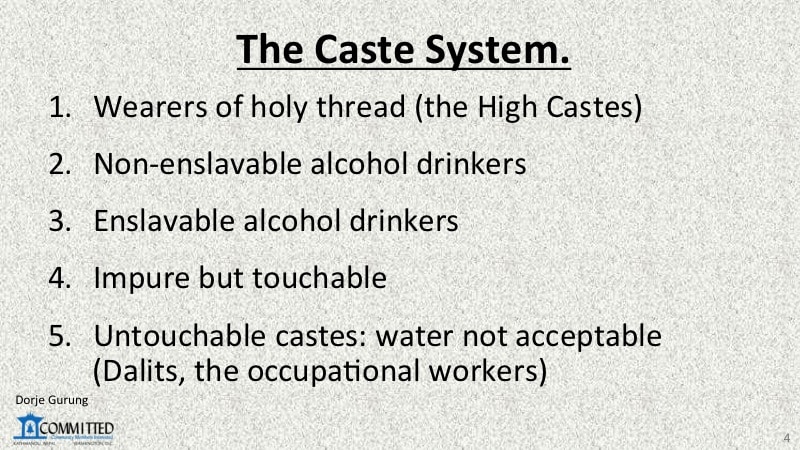
And yet, here’s how some Nepalis chose to read and interpret the stories, how some others chose to attack the author and the editor of the newspaper, and one despicably vilely too!
In the first of the following two, the user attacks the publication, saying, “South Indian movies appear to have been a positive influence on Sete [Setopati].” However, I must confess I don’t get the reference or association. The second user basically blows off the write-up by saying, “Whatever!” in Hindi.
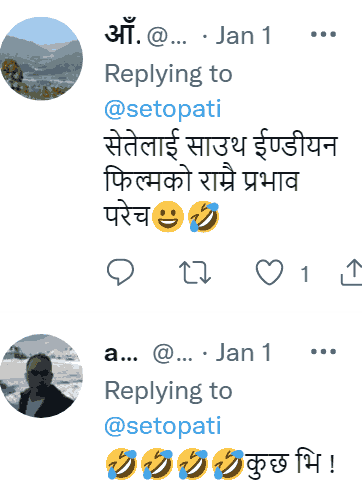
In both the next two reproductions, the users basically accuse the author of being a liar. The first users says, “Whoever wrote this article is the [sic] big liar. Stop promoting Hate [sic] among people.”
The second one, really no different, says, “I haven’t been to the US but, given that even in urban areas of Nepal caste-based discrimination has been slowly decreasing, I can’t believe that to be the case in the US. There can’t be any truth to the stories, they must be fictional accounts.”
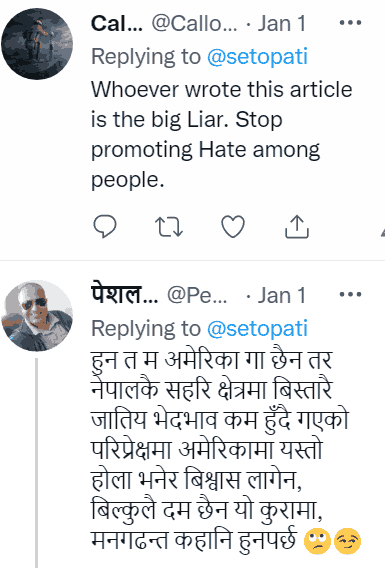
Anup, the first user in the reproduction below, contends, “Based on years of personal experience of life, what I can say is that this is a completely made up and baseless account. In the West, their laws are so strong that one can’t even imagine such things [discrimination] taking place.” That of course is laughable! He further adds, “As can happen some times, an individual could be misguided but the level of caste-based discrimination detailed in the article does not exist. It’s just a story.”
The second user attacks the editor of the publication, saying in the first sentence, “Wagle [the editor] is attempting to sow caste ideas from Nepal all the way to the US.” He rounds off his three-sentence response by saying, “But then again, if [he] doesn’t write about caste, he’ll have no income, ok.”
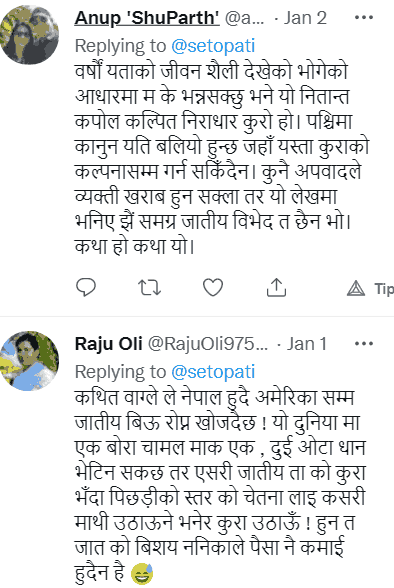
The user below finds the story incredulous. Says, “How many Nepali real estate owners are there in the US?!” S/he adds, “I am in NY for more than 25 yrs. Pls don’t BS.” The user rounds that off with another response just below it characterizing the stories as a “Big joke.”
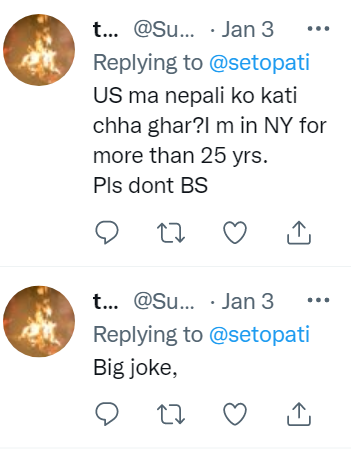
Santo_sham, in his response below, going after the characters of the tenants, postulates, “For sure the reason isn’t just Caste…story is easy to understand. Likely also because of non-payment of rent on time or engaging in unacceptable activities.” User ends saying, “There’s no shortage anywhere of those making up stories and seeking attention.”
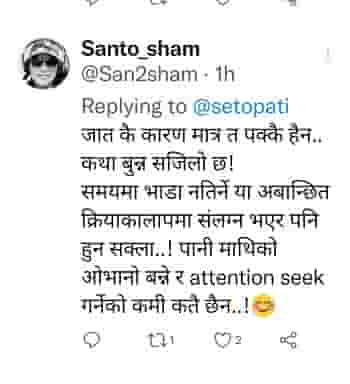
Below, Yubaraj Bhattarai accuses the author (and possibly also the publication) of being a dollar-farmer. Response says, “Dollar-farming. Untrue baseless story.”
Kamal T Bam also attacks the editor of the publication. “Setopati, send Narayan Wagle to the USA…weaves whatever stories occur to him and publishes. It can be tough making money through hard work.”
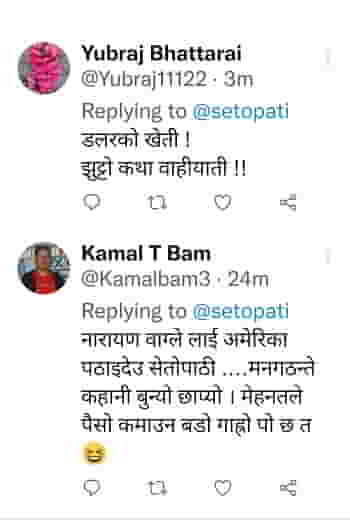
The following two, to be honest, I don’t quite understand! They do appear to be objecting. That much I am able to deduce.
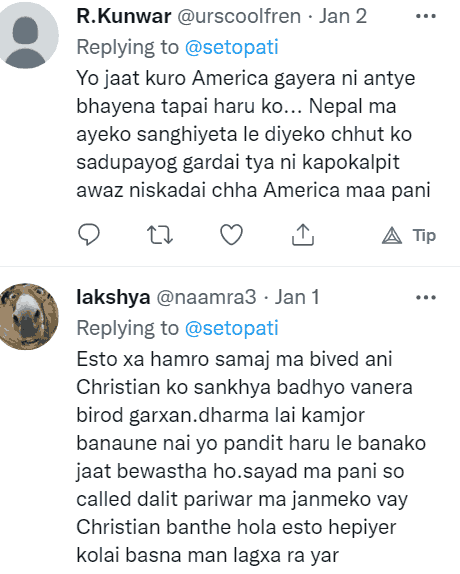
“Even getting to America, the stories also turn out to be shit,” says the first user below. The second one proclaims, “Fake news.”
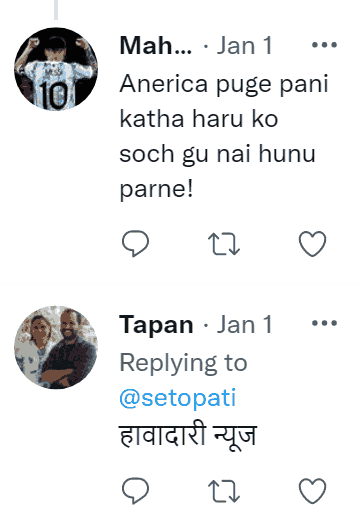
Krishna below is NOT different from others above. He declares, “This news is a fictional story or sample writing. Damn, this is way too much of misinformation. Here’s the truth, in the USA no one thinks about caste, forget ever bring up. There they sing praises of human rights.”
Restless, on the other hand, asks, “Can one not rent from anyone other than Nepalis even in America[?]”
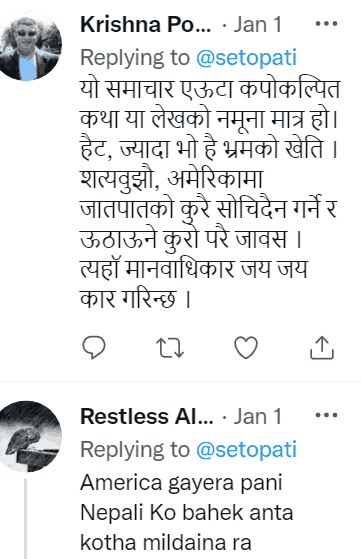
Ishwor Pathak also declares, “You must be in wrong America; not the USA!!” Teklal Bhusal blows off the stories saying, “A totally made up article exporting caste in the US.” Sujan Bagale, on the other hand, adds, “Say, who taught this khairey [derogatory Nepali term for a white person] all this, they are imitating our ways.” Hmmm….
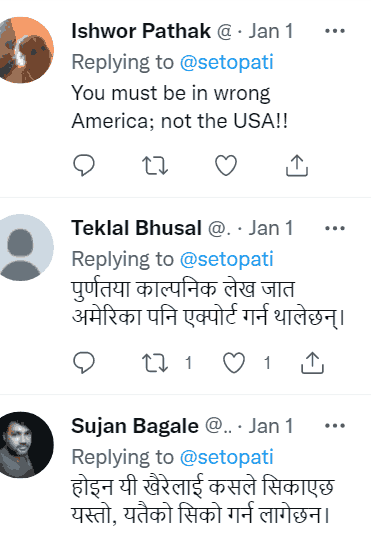
Bal Bahadur Mahara asks in Hindi, “What are you talking about[?]” Sushil Shresta reponded with a suggestion, “Better if you just buy your own. There are so so many housing, apartments for sale.” Upendra thinks and believes, “This is all just nonsense. If people go in search of a place to stay to save money, it’s up to the owners to rent or not.” Of course! How could they NOT have known that?! I am being sarcastic, of course!
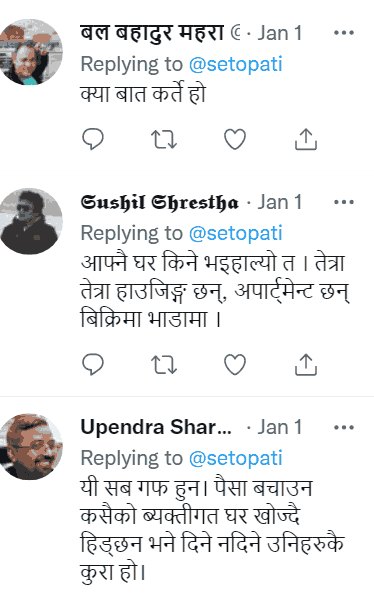
Shivakthapa, not unlike a number of others, believes the stories are untrue. “Wow what a nice story writing but Not [sic] related with any real incidents,” says he.
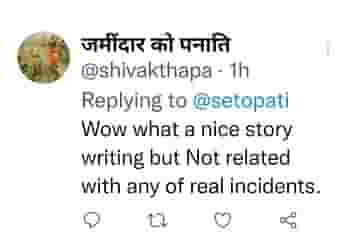
In the screenshot below, the second one is actually a positive response. Regardless, the first one says, “To go viral create a totally fictional story and file a case,” which does not quite make sense. The sensible one below it says, “This will be so for as long as mentality doesn’t change.” The third one is really vulger and vile. Says, “Your vagina should be set fire to[.] Bullying Bahun [so-called highest caste] even there[.] That b*tch should be pinned down on her stomach and f*cked.”
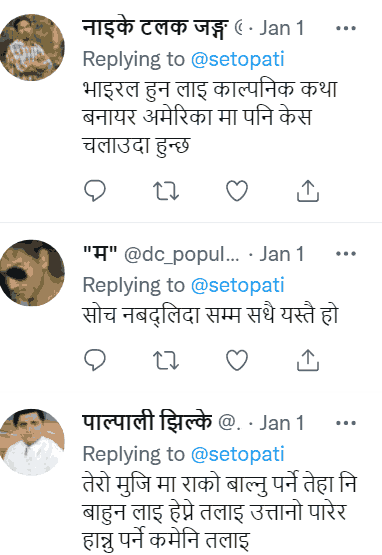
Apart from the second one above, there were a few others that were sensible. Some even amplified the stories in the article. The one below, for example, concurs. Say, “I have seen, in London, people refusing to rent because of caste.”
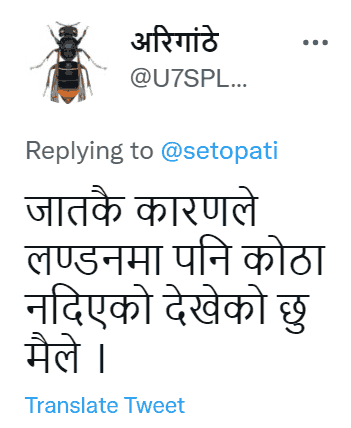
The following response, by Ramji Pariyar, also a Dalit, says, “There may be truth to them because I have suffered from that in many places.”
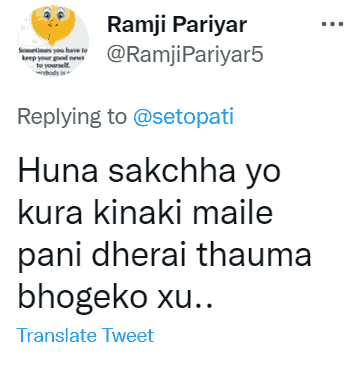
Another Dalit (KG Bishwakarma) shares an observation. “People in comment section are so triggered that they are unwilling to accept. I faced it in UK, often face it in Canada. So I often stay away from Nepali people.”
He echoed something I also did all those years abroad: staying away from Nepalis. One of the many reasons I did that was one of the reasons for “escaping” from Nepal in the first place: to get away from Nepalis! Luckily for me, that wasn’t difficult. Only four cities — out of the fourteen — I lived in around the world had significant Nepali population.
Dr. Nirmal validates and re-affirms Bishwakarma, stating, “I am in agreement with you. From time time, in Europe, I have seen some high-minded individuals expressing caste-driven opinions.” He further adds, “Those comments reveal their mentality, practices, and culture Kishor [Bishwakarma].”
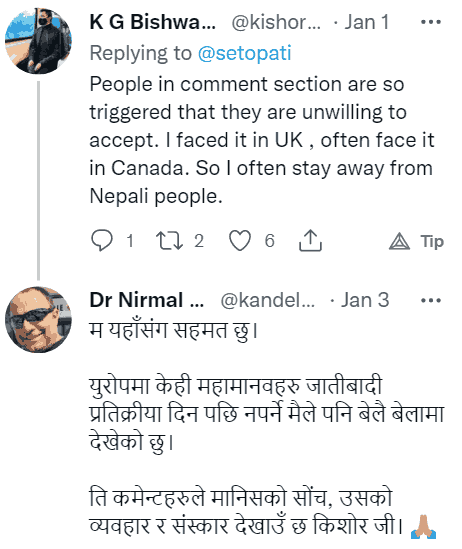
The above reactions aren’t unusual. I have had middle-aged classmates try to gaslight me about a childhood experience I published more than half-a-dozen years ago. The story goes back decades…to when we were residential (boarding) school students at a primary school. “It couldn’t have happened because we couldn’t have done what you contend we did and therefore we can’t imagine it happening” was one line of reasoning. In fact, just a few months ago, I discovered they were still so convinced of their interpretation of my personal story, according to which I insulted them, that they still want me to apologize to them.
We don’t have a dearth of Nepalis who frequently make the mistake of interpreting what someone else is saying, writing, and/or doing from only where they stand — culturally, economically, socially, experientially, emotionally, intellectually etc. — and, in the process, miss a lot of where the person is coming from and also the value in their message and/or their act.
In spite of Nepali society being incredibly multi-ethnic (126, according 2011 census report), multi-lingual (123), multi-cultural etc. etc., the quality of education, both formal and informal, is so poor that they do NOT instill in the population any tangible appreciation for any — forget all — of that.
Sure, limited respect for people different from oneself is instilled in or acquired by the population. But because even that respect is based on very limited understanding of who and what the others represent, it is really hollow respect. In that way, the apparent respect EVERY Nepalis professes to have for fellow Nepalis is similar to the respect for adults the culture instills in children. Namely, respect based on fear, and so it builds no bridges.
Valuing hollow respect, and living in denial of the monstrous caste system, what can one expect?! Many of the atrocious sentiments, ideas, views, and opinions expressed under the article is one of the many consequences of that and one of the many demonstrations of the corrupt minds of the people in the society.
We are a society where caste pretty much dictates who you marry, who you mostly work with, and even who you associate with more or less. Therefore. most live in pretty small and limited social and professional bubbles. Is it any wonder then that Nepalis struggle to recognize or imagine Dalits suffering in that way in the US?! Is it any wonder that they struggle to put themselves in the shoes of someone else from a different caste and empathize with them?! Is it any wonder that, worse, Nepalis will even commit rape and murder in the name of caste?!
Children, however, can be educated and raised to be compassionate human beings, which will be a whole different blog post all together.
What do you think?
Additional Materials
I have written a great deal about the caste system and, if you are interested in the details I have alluded to in this blog, follow the links below.
- In the Land Everyone Takes Pride in as the Birth Place of Buddha, We are Very Short on Compassion reproduces Nepalis’ responses, on twitter, to a tweet by a Dalit woman expressing a desire to live as a human being.
- The Story of Eklavya and Dronarcharya: More of Caste Supremacy Than Model Discipleship is about how the mythology exemplifies the terror tactics used to suppress Dalits and others to maintain and justify caste supremacy, among other things.
- Caste System Can Corrupt The Mind, Kill The Spirit, And Strip One of Humanity is about how Nepal is in denial of the caste system and their dehumanization of Dalits.
- Like Gods, Like Humans? Or, Like Humans, Like Gods? Or, Like…F*cked up? is about how some in Nepal justify prohibiting Dalits from practicing their religion by entering temples.
- Social Justice: Caste Away is about how Nepali society viewing and treating Dalits (and others) as inferior because of their low-caste birth and forcing them to live their lives in shame as a “punishment” is wrong and, if anyone should be ashamed, it should be those who interpret their birth caste as such and make them suffer.
- Grade 8 Social Studies Textbook: The Caste System Is a “small” Issue is about how that’s the ONLY entry about the system in the whole textbook.
- Social Justice: Want Compassion? Show Compassion! is about how Dalits were DELIBERATELY prevented from receiving relief materials in some places and, in others, provided left overs following the quakes of 2015.
- Caste Out is a Dalit’s personal story of life-long discrimination and abuse.
- So You Think There is No Caste-based Discrimination in Nepal? Think Again! reproduces a twitter thread — started in July 2018 — documenting incidences of discrimination and abuse Dalits suffer from.



